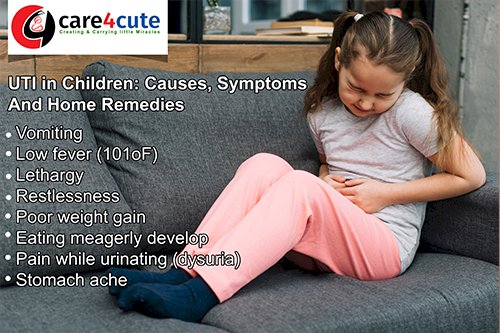UTI in Children: Causes, Symptoms And Home Remedies
Is your child is suffering from UTI related health issues? Here are all the information related to its UTI Causes, Symptoms And Home Remedies.

The urinary tract comprises of the kidneys, ureters and the bladder. They work in combination to alienate the waste and extra fluids out of our body in the form of urine.
But often, the process may not be smooth due to an infection of the urinary tract.
Urinary tract infection or UTI is quite common in adults. Can children also be affected by it? How can you know if the child has UTI and what can you do about it? Keep reading this post.
What Is UTI?
UTI is the “microbial invasion” on any part of the urinary system.
The bacteria that generate inside the urethra get flushed out through urine. But sometimes, when they are not expelled, it results in an infection in the urinary tract.
About 80% of the cases are caused by Escherichia coli (E.Coli) and the rest by other species including Klebsiella and Staphylococcus.
The urinary tract infection mainly occurs in the bladder, but the kidney may also be affected by it.
Types of UTI
We can classify UTI based on the area of infection:
- Upper UTI – If it has infected the kidneys or the ureters, the kidney infection leads to pyelonephritis.
- Lower UTI -If the bladder or urethra is infected; the bladder infection results in cystitis.
The infection is more common in girls than in boys due to their anatomy. Let’s see why the infection can happen in children, especially in girls.
Causes Of Urinary Tract Infection In Children
A child can be affected by urinary tract infection due to one or many of the following reasons:
- The bacteria that generally reside in the digestive system enter the urethra and infect the urinary tract.
- While cleaning the bottom, a kid’s soiled toilet paper may come in contact with the genitals, leading to the entry of bacteria and a subsequent infection.
- Therefore, a girl is more prone to this condition as her anus is closer to her genitals, through which the infection can sneak into the urinary system.
- Wiping the anus from back to the front; this passes the bacteria present on the surface of the anus to the genitals, especially in girls.
Some children are more prone to developing UTI due to other health concerns such as:
- Constipation sometimes causes inflammation of the large intestine. As a result, it puts pressure on the urinary bladder and prevents it from emptying completely.
- Dysfunctional elimination syndrome is a group of conditions pertaining to issues with urination and defecation. DES causes UTI because the children having this condition urinate infrequently.
Vesicoureteral reflux (VUR) is an unusual condition where the urine flows backward from the bladder to the kidneys, leading to kidney infections. This is interrelated to UTI.
As mentioned above, girls are at a higher risk than boys. However, there are other risk factors too.
Risk Factors Leading To UTI
Below are some factors that increase the risk of your child contracting the infection
- Congenital abnormalities of the kidney and urinary tract such as renal agenesis in which one or both the kidneys fail to develop.
- Uncircumcised male infants have a higher risk in the first six months as bacterial colonization occurs in the foreskin. But the colonization reduces as the child grows
- Unhealthy toilet habits such as controlling their urge to urinate make children vulnerable to UTI.
- Also, children who have poor toilet hygiene practices, such as not washing their hands before and after using the toilet and keeping the toilets unclean, spread the infection.
- Children with a weakened immune system are susceptible to viruses and bacteria.
If your child complains of burning sensation or pain while urinating, look out for the other symptoms of UTI.
Symptoms of UTI in Children
It is not easy to identify UTI in young children as the most symptoms are not specific such as.
- Vomiting
- Low fever (101oF)
- Lethargy
- Restlessness
- Poor weight gain
- Eating meagerly develop
Older children can tell their problem, and here are the symptoms they might have.
- Burning sensation when urinating
- Frequent urge to urinate
- Cloudy urine
- Pain while urinating (dysuria)
- Stomach ache
- Odor in the urine
- Wetting the pants in spite of being toilet-trained
- Red or dark colored urine is a sign of blood in the urine
- Bladder feels full even after urinating
If the infection spreads to the kidneys, the symptoms will include:
- Fever with shaking
- Reddened skin in the genitals
- Vomiting
- Flank pain
- Severe abdominal pain
If your child has a combination of the above symptoms, call your doctor immediately
Treatment of UTI In Children
The doctor will begin with generic diagnosis by asking about the child’s general health condition and symptoms.
- A physical examination is done for genital abnormalities to be checked such as phimosis in boys and vulvovaginitis in girls.
- Then a urine test would be suggested. The urine sample will be taken for lab analysis to detect the presence of the bacteria.
A urine culture helps identify the species of bacteria that is causing the infection.
If the child has recurring UTI episodes, then some more test may be suggested by the doctor to check if it’s happening because of an anatomical defect. In such cases, diagnosis methods include:
- Cystoscopy: The doctor sees inside the bladder and urethra using a camera lens.
- Urodynamics: The storing and releasing function of the bladder is investigated through this method such as how much urine can the bladder hold, the speed of discharging the urine, etc.
- Renal/ bladder ultrasound: Renal ultrasound helps in understanding the kidney size, shape, and location.
- VCUG (voiding cystourethrogram): It helps to understand the complete bladder, if it is emptied without obstruction or there is reflux of urine.
- IVP or intravenous pyelogram: The x-ray test helps diagnose blood in urine or any pain in the lower abdominal tract.
The imaging tests need to be sparingly used considering the costs involved and the adverse effects such as radiation. They are done only if the UTI is recurrent or complicated.
Once UTI is confirmed by the tests, the antibiotic treatment will be started by the doctor.
Treatment for UTI in Children
The following treatments may be recommended by the doctor for your child:
- UTI is usually treated with antibiotics.
- The antibiotic treatment is dependent on the results of the urine culture test, and the kind of bacteria.
- Oral antibiotics work well when there is an infection in the bladder.
- If there’s any serious matter, such as an inflammation of the kidneys or pyelonephritis, then intravenous antibiotic treatment is recommended. For that, hospitalization may be needed.
- Medicines for pain relief may also be given by the doctor.
Some antibiotic medicines given to children are.
- Trimethoprim or sulfamethoxazole (Bactrim/ Septra)
- Amoxicillin or clavulanate (Augmentin)
- Cefixime (Suprax)
- Cefpodoxime
- Cefprozil (Cefzil)
- Cephalexin (Keflex)
Homeopathic Treatment for UTI
Alternative treatments may also be tried such as homeopathy if the UTI is recurrent and the antibiotics are not working effectively. Homeopathic treatments work towards a long-term and overall recovery of the patient.
Depending on a patient’s symptoms, the homeopathic practitioner may suggest phosphorus, colibacillinum, platinum metallicum, candida albicans, causticum, cantharis and eupatropium .
The medicines should not be started without consulting a specialist.
In addition to the medications, you may support the treatment with some home care and remedies.
Home Remedies for UTI
Here are some UTI home remedies that may be tried for your child:
- Increased fluid intake: Drinking water throughout the day will flush out the bacteria through urine.
- Probiotics (good bacteria): Give your child probiotic-rich foods such as kefir, yogurt, sauerkraut, and kimchi.
- Cranberry: While there is no evidence of cranberry’s usefulness in the treatment of UTI, it may be used as a preventative strategy .
- Allicin: The oily liquid present in garlic has strong antibacterial qualities, especially against E.coli .
- D-mannose: D-mannose powder can help in preventing recurrent urinary tract infections, especially in girls.
- Vitamin C: Vitamin C makes the urine more acidic, which prevents the growth of E. coli bacteria.
- Clove oil: The essential oil has antibacterial and antifungal qualities, and promotes healing.
- Oregano oil: Its antibacterial properties inhibit the growth of E.coli.
Cinnamon, Echinacea, marshmallow root, dandelion, and blueberries may also be tried.
Note that these home remedies may be taken along with antibiotic treatment but not as its replacement. However, the best way to deal with UTI is to prevent it.
How to Prevent UTI In Children?
Here is how UTI can be avoided by your child.
- Teach your girl child to wipe herself from front to back. The chances of anal bacteria entering the urethra and infecting it can be reduced in this way.
- Make them drink enough water to flush the bacteria out of the urinary system.
- Encourage them to urinate often and not hold it back.
- Maintain good hygiene and keep the genital area clean and dry.
- Do not use nylon underwear as they promote bacterial growth. Instead, use loose cotton underwear for your children.
- Avoid using perfumed products, scents or powder in the genital areas.
Yogurt can be added to your kid’s diet as it is a probiotic.
- Say no to bubble baths.
Good toilet habits and hygiene can prevent UTI significantly. And prevention is necessary if you want to avoid the complications, though rare.
Complications Of UTI In Children
The following are some complications arising from UTI:
- The bacteria may ascend to the kidneys and spread the infection, eventually causing kidney damage.
- If the infection spreads to the blood from the kidneys, it can lead to blood poisoning.
- Reduced functioning of kidneys.
- Hydronephrosis or inflammation of the kidneys.
- Sepsis, a serious infection that may cause multiple organ failure .
Note that the complications are unusual and happen in the extreme cases of infection.
Next, we will answer some more commonly asked questions on UTI in children.
Frequently Asked Questions
1. What is recurrent UTI in children and how to manage?
Very few children have a recurring UTI. However, if a child has had UTI before, it is necessary to keep an eye on any symptoms. Whenever, the symptoms return, consult the doctor immediately.
If your child has a health problem that may increase the risk of UTI, such as structural abnormality of the urinary tract, the healthcare provider may give antibiotics in low dose as a long-term preventive measure for recurrent breakouts.
2. Is UTI in children contagious?
Urinary tract infection is not contagious. Touch or physical proximity never spread UTI. It also does not spread from sitting on a toilet seat that is contaminated.
3. How long do UTIs in children last?
The child can get relief within two to three days once the treatment is started.
UTI is one of the most common infections in children. However, they recover from it within a few days and get back to normal life. Check on the child’s symptoms and take them to a doctor to control the infection before it spreads. A little care will help in a great way.
If you have an experience to share, Let us know in the comment section below.



































Comments (0)